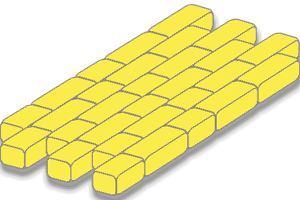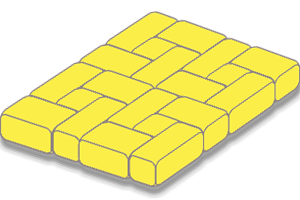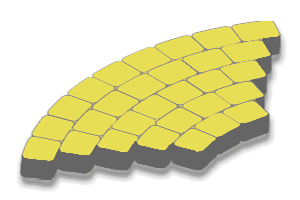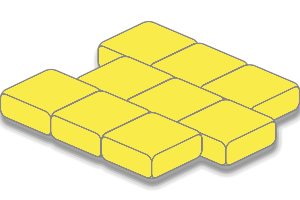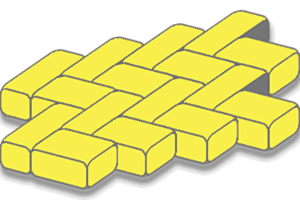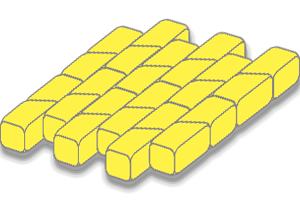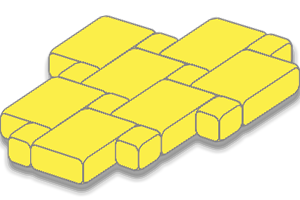Menu
close
Permeable materials are becoming the norm Houghton Le Spring, and with good reason. They are better for the environment, so if you're looking to install a driveway on your property, make sure it's made of porous material that will be environmentally friendly.
When installing a new permeable surface in Houghton Le Spring like this, there can be some restrictions concerning planning permission. Still, as more people start using them, it should become easier to get approval from local officials.
Concrete is a durable and long-lasting material, but its production requires vast amounts of energy. Furthermore, rainwater runoff has difficulty soaking back into the ground when it reaches concrete's impervious surface.
The disruption in water flow can cause problems for ecosystems that rely on this natural cycle to function properly. Fortunately, permeable pavers provide an alternative foundation material that allows water to soak back through them more easily than traditional cement.
Permeability refers to the ability of water or other liquids to flow through an object, substance, or material. The definition can be confusing because regulations do not define permeable what makes something impervious and non-permeable surfaces. That said, it's easier if you know that this legislation was designed specifically for funneling rainwater away from drains and sewage systems.
Therefore, concrete, tarmac, block stone, or flag paving are not suitable for this purpose. Gravel is an option for permeable driveways that will help absorb runoff while allowing it to flow through naturally. Other options include shingle (which offers better protection than gravel), reinforced grass (since there's less need for management), wheel tracks in compacted earth that show where rainwater would run off if allowed on their own.
The use of permeable solutions in landscaping can naturally seep water into the ground instead of running off and causing flooding or erosion.
Whether you have a family or not, some things go without saying. When it comes to your property in Houghton Le Spring and home design, one of the most important decisions is what type of driveway material will be best for you. Often, this choice can determine how much time we spend at our homes in various seasons and dictate which cars (or other vehicles) get driven through the said area with regularity.
With so many permeable driveway options out on the market today, though, it's easy to become overwhelmed when trying to choose exactly what porous surface is suitable when laying your paving slabs. It is also important to note that the driveway planning permission does not apply if your new or replacement driveway uses a permeable or porous surface.
A gravel driveway is a popular choice for many homeowners because of its low price and easy installation. The look can be made even more attractive by adding the material over weed mesh to appear clean from outside viewings.
One of the most annoying parts of owning a home is having to deal with weeds. They grow through cracks in your driveway and make your garden look messy. Fortunately, there are weed meshes that go on top of gravel surfaces, so these pesky plants won't be able to get inside - although they can still find their way underneath. The mesh also helps prevent greenery from growing through at an angle, but this isn't great for steep slopes because water may force loose stones away more quickly than usual since there's less surface area near where they're planted now.
If you're looking for a more natural driveway, then gravel is the way to go. But before making any decisions about what type of material or style will work best in front of your home, some things need to be considered first. Namely, whether it's an incline and if water can seep through easily. You should also consider factors like rainwater harvesting for domestic driveways and how steep the surface is. A steep foundation, just like a loose aggregate, can lead to stones or shingles losing their holding place on top with all the pressure placed against them by cars passing over every day!
Wheel tracks are a great way to give your car's tires grip. The idea of using wheel tracks is to place flags, stones, or paving on the areas where a car will touch. This can be done to prevent cars from damaging other parts of your driveway, and it also prevents them from spinning their wheels when driving over gravel.
Wheel tracks are a great way to make your property feel secluded, even if it's not. The most popular feature is that you won't need planning permission as long as the paved area for wheel tracks doesn't exceed fifty-two meters in length and width--which should be plenty of space!
Maintaining this type of driveway does involve some work: gravel will have to be replaced every few months; the grass needs frequent mowing, so weeds don’t take over; piles must stay free from garbage or debris because they can quickly become an eyesore. But with all these efforts, your home will never look more private than when visitors see only those rusted metal lines running through their yard like railroad rails leading up to nowhere.
Tracks placed on the drive for cars, or wheel tracks, can help you keep your driveway free of gravel. This is easy to prevent damage and frustration with vehicles driving over it; just lay flags down in areas where a vehicle will likely touch.
Reinforced grass is taking over the landscaping niche as more and more homeowners come to prefer it. Relying on a layer of thick plastic, rubber, or concrete mats laid out across your lawn, reinforced greenery provides peace of mind when parking cars in front of their homes while maintaining an organic appearance that's not harmful to either humans or animals.
Thanks to the mat's grid-like design, it will allow vegetation to grow through without needing any other gardening maintenance like cutting and trimming because there is no heavyweight pressing down that could damage roots. This means you don't need costly plantings which can easily be removed over time due to changing tastes but instead have one simple installation with reinforced grass driveway parking.
Reinforced grass is an excellent choice for those who want to pave their driveway and maintain a natural level of kerb appeal. Mowing the reinforced grass can be tiresome, but most homeowners do this anyway.
Unlike traditional car parks, which are often constructed from brick or rough asphalt paving stones, these materials won't harm vehicle paintwork with tire marks left behind by drivers!
The biggest issue with having a reinforced gravel parking area may just be finding out what type of lawn you have available to plant it through mesh that works as reinforcement--but if you already have or are ready to install it all, then go ahead!
No, it’s not. The surface of the tarmac is made up of small stones or tiny pieces of concrete that are bonded together with a tar-like substance which creates gaps between the materials that prevent water from seeping into the soil below.
These large gaps create a type of seal to protect against any infiltration by groundwater, and because tarmac cannot hold moisture after rain, there isn't puddling on driveways; for example, they will drain quickly. However, due to its impervious nature, this material can't be used over porous surfaces if you want them to retain their ability to allow groundwater to infiltrate through easily.
The permeability of a material is its ability to allow water to seep through it. Permeable materials, like flagstone and paving blocks, have small gaps between pieces that can be filled with rainwater, which will soak into the ground below.
Block paving is a type of permeable material because it allows water to seep through its surface. The gaps between the individual pieces are small enough to allow for ground absorption and drainage but large enough to impede vehicle traffic or pedestrian movement on top.
Driveways are an important part of any home, but impermeable surfaces have a downside: they present several issues. A common issue with impermeable surfaces is that rainwater might lead to severe flooding as the H2O doesn’t soak into the soil.
This can be seen in global warming gets worse, this problem will arise more and more for property owners all around. It's essential from a legal perspective to have planning permission if your driveway isn't permeable. Still, there are exemptions for paving one's front gardens because of how different their needs may be from those of an average householder.
Impermeable driveways are not permitted developments, adding a huge amount of stress and confusion to another simple job.
Deciding on what kind of driveway material is best for your home can be difficult enough without worrying about if it's legal or not. Impermeable materials such as asphalt cannot typically be installed in developed areas because they often affect people and the environment.
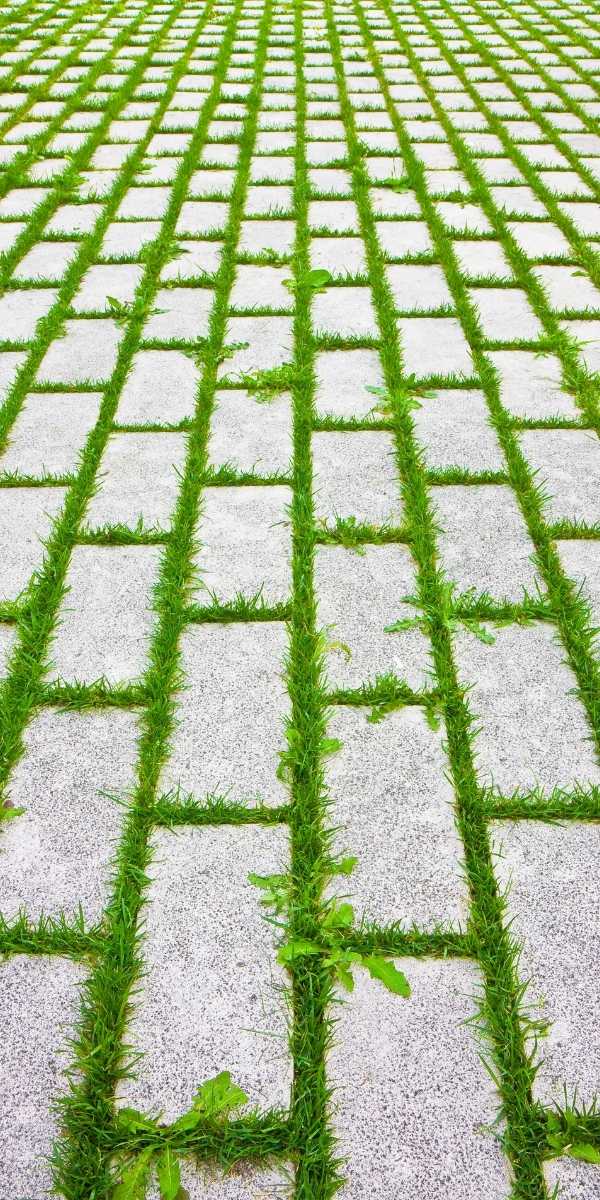
Get your permeable concrete block paving to keep pollutants from seeping into the ground.
Permeable pavement reduces some of our most harmful environmental contaminants by trapping them and breaking them down over time, including bacteria that can degrade chemicals like polychlorinated biphenyls (PCBs). This is because pavements are made up of many small spaces where water or air flows through easily - which means it's easy for oxygen-loving microbes in soil and plants living between cracks in a paved surface to break poisonous compounds down before they have the chance to do their damage.
A permeable driveway surface is an important part of sustainable building. Suppose you're planning your patio or driveway. In that case, it pays to know the difference between a non-porous and porous surface so that you can make an informed decision about which one's best for sustainability. One key benefit of using a permeable surface over other types is rainwater capture. Permeability allows water to be absorbed naturally into the soil below instead of flowing off your property like with asphalt driveways or cement patios. Both result in runoff pollution downstream as well as greater risk for flooding due to unsafe storm sewers built too high above the ground level (which has become more common).
There are several different options, from gravel to porous asphalt or permeable block paving with gaps between them or soil over tarmac-based pavers, depending on the look you want for your property. This can be especially important before installing any permeable paver product if you live in an area prone to flooding or hilly terrain where there might not be adequate drainage during rainstorms!
The new regulations call for almost all paved paving materials used within a project site to be made from permeable material such as gravel or (permeable paving). Non-permeable are allowed so long as there is adequate provision for the drainage system at that location, such as installing trench drains or soakaways where necessary.
The new regulations make it more important than ever to consider the impacts of rainwater on a property and its drainage system. This is especially true for properties with permeable surfaces because stormwater may collect and pool in these areas, causing unwanted runoff and flooding or erosion if left unmanaged.
The development of sustainable urban drainage systems (SUDS) can help to alleviate flood risks in areas that experience heavy rainfall and flooding. SUDS involves using natural processes, such as using water plants like reeds or grasses for absorption rather than concrete channels, which often overflow when it rains too much.
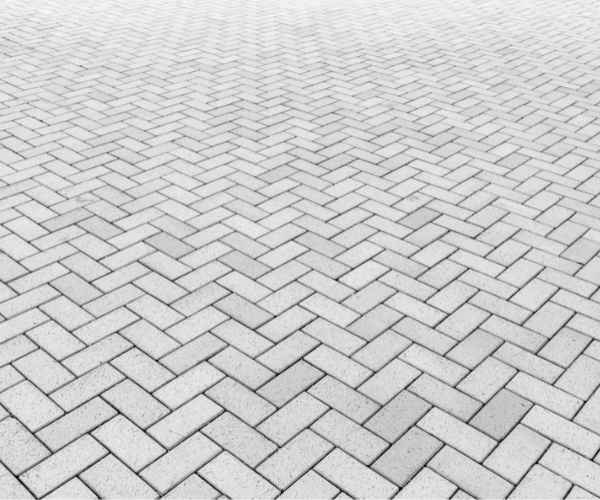
We have the perfect permeable paving slabs for any surface: patios, driveways, and pathways. Our versatile products can be used on your garden to make it feel more homely or help you get around easier. And there's no better way of reducing water drainage than with a Sustainable Drainage system (Suds). Send us an email for a quote - we've got something for everyone.

